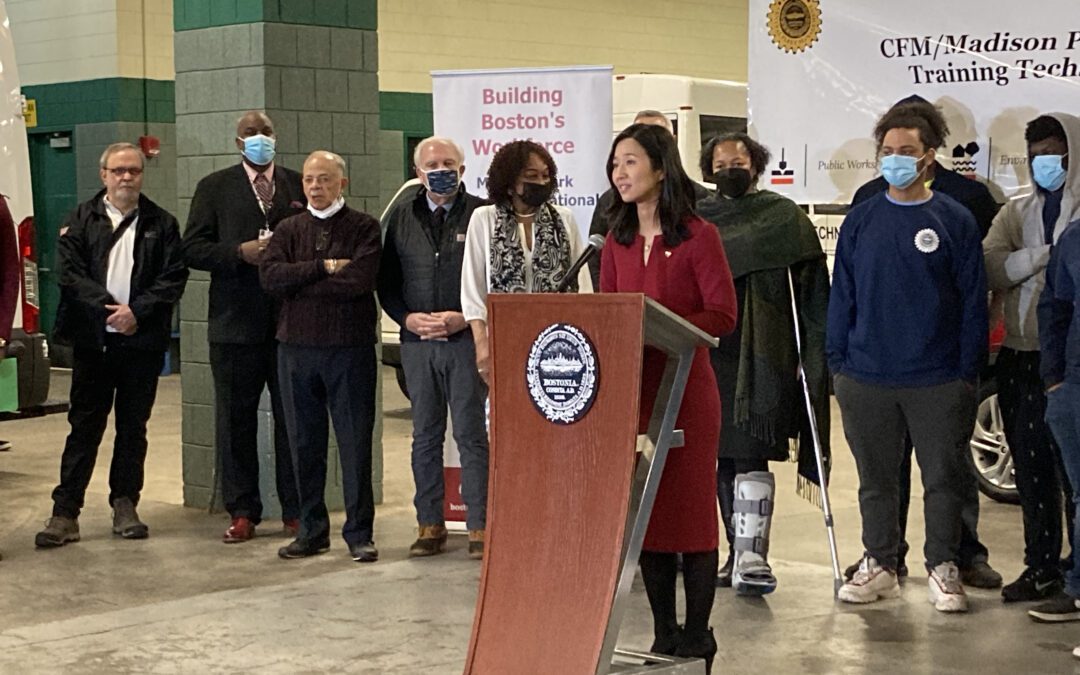
by James Sproul | Apr 25, 2022 | Education, Electric Vehicles, Events
Royal Bolling, Kevin McCaskill, and I were proud to be part of the City of Boston’s Electric Vehicle Announcement at Madison Park Technical Vocational High School (MPTVHS). Mayor Wu was there to kick off an EV tech training program for city workers, Madison Park students, and college students from Ben Franklin Institute of Technology.
Over the past year we worked hard for this day. It represents a huge step in preparing Boston students for tomorrow’s jobs, as well as making the city a leader in addressing the climate change crisis. To get the details, you can view the full announcement event here on YouTube, or simply scan the summary on the following pages.
Jim Sproul
Founder, The Sproul Company
Co-Founder, Cardinal Works
Electric Vehicle Announcement-City of Boston & Madison Park Technical Vocational HS
City of Boston Central Fleet Maintenance (CFM) / Madison Park Collaboration
Training Techs for the Future
Wed, April 6, 2022
10:00 – 10:45 AM
Madison Park Automotive Garage
Background
Over the last six months a collaborative effort was put forth by those identified in this Electric Vehicle Announcement that was funded by a grant for City of Boston, Department Environment, Energy and Open Space. Below is a timeline of the invited speakers.
00:00 – 00:50: Welcome To Madison Park – Dr. Sydney Brown-Head of School
Dr. Brown announcing Mayor Wu and Electric Vehicle training at Madison Park.
0:50 – 06:45: Mayor Wu’s open remarks include comments on how important vehicle electrification is to the climate and jobs of the future. Transportation is the 2nd highest cause of pollution and the City will lead by example and begin electrifying their school vehicles and buses. To do that, the workforce will need to be trained to support this program and charging stations will need to be installed. To begin, 10 city mechanics will be trained in a Train the Trainer program and in partnership with Madison Park. Starting in the fall of 2022, electric vehicle service and maintenance will become part of the core curriculum at Madison Park and offered to Benjamin Franklin Technical Institute as well. Mayor Wu will launch a pilot program for school bus electrification. Complete electrification of 700 school buses will be complete by 2030.
6:45 – 09:18: Rev. Mariama White-Hammond, Chief of Environment, Energy and Open Space-As an EV owner, she has to take her vehicle for service outside the City and wants to have it serviced here at Madison Park. Green jobs create opportunities in the leading edge technology and will transform the economy. The Chief looks forward to seeing all City vehicles service by “our own”.
09:18 – 15:08: Jascha Franklin-Hodge, Chief of Streets: Climate change is real and calls for urgent action as the window is closing. The City transportation department will take this seriously and prepare the city workforce for this electrification. This is opportunity for economic growth for new jobs and critical infrastructure. The City has an EV ready program for charging stations, a pilot program for electric bikes and EV Car Share program to help spur demand.
15:08 – 17:00: Delavern Stanislaus, BPS Director of Transportation: Discussed her pilot school bus electrification program. Next year they will have an equitable green initiative. See Boston.com for related article, “Boston to replace school buses with electric by 2030”
17:00 – 19:27: Kevin McCaskill, Assistant Superintendent, Boston Public Schools (BPS): Kevin starts by thanking those who have helped get the program up and running (Bill Coughlin, Royal Bolling & Jim Sproul). Madison Park has the ability to take a educational leadership position in the country with this leading-edge program for students of color. Kevin stresses to provide BPS continued support for the program.
19:27 – 22:05: Bill Coughlin, Director of Central Fleet Maintenance, City of Boston-Thanks all those that made this program happen and spoke of his 9-year relationship with Madison Park. He is expecting that within 18 months, a senior class should have gone through the program, City employees will have been trained and Benjamin Franklin will have classes offered. Bill thanks all the electric vehicle partners at the announcement that provided vehicles and he highlights how technology is changing the workforce and educational needs to service the fleet.
22:05 – 23:46: Mayor Wu’s Closing Remarks- Thanks all the students and specifically a rising star, Briana Duran, Massachusetts Association of Vocational Administrators (MAVA) Student of the Year.
23:46 – 37:09: Mayor Wu Press Q&A Session
Additional Reference Links:
1. Mayor Wu Announces Progress Towards Electrifying City Vehicle Fleets, April 6, 2022
2. Mayor Wu announces new electric vehicle plan in effort to reduce vehicle emmissions, December 10, 2021 by Boston Globe
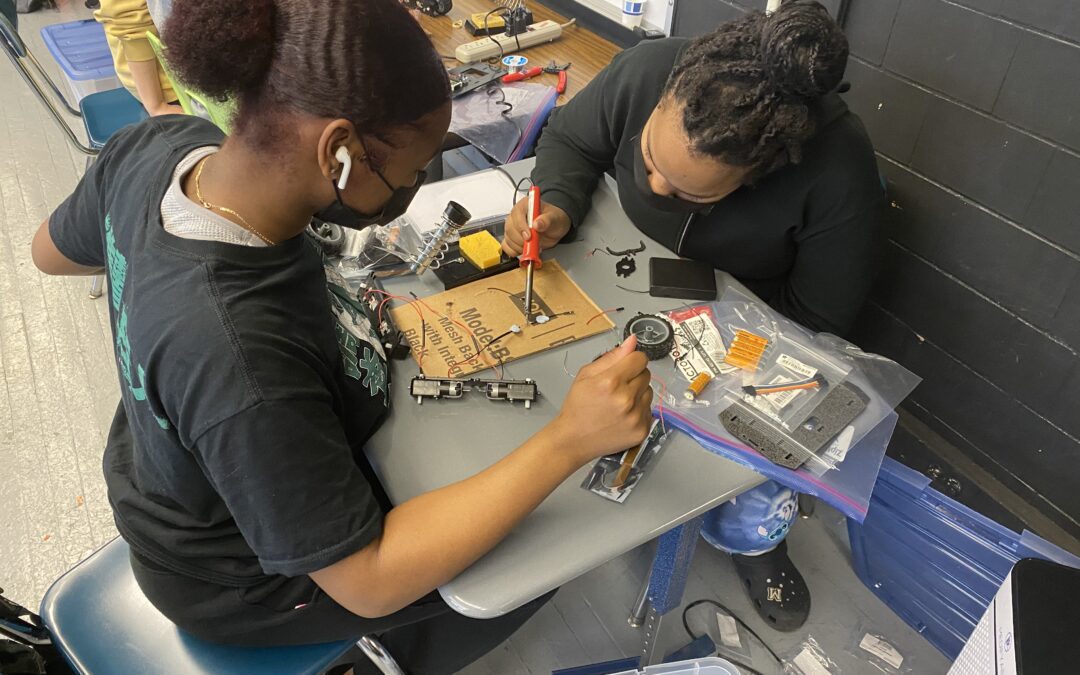
by James Sproul | Apr 25, 2022 | Autonomous Vehicles, Education
Tomorrow’s job landscape will not look like today’s. Students at the Timilty Middle School in Roxbury are preparing for that future in a hands-on STEM program using autonomous vehicles.
Called ‘Tiger Works’, this after-school program engages a dozen students in all the aspects of first building, then programming a fully autonomous small robotic car that can drive itself around a complex track.
Hands-on STEM Education
“Tiger Works is an extremely effective way to introduce some important engineering concepts.” Said Marvin Gutierrez, Principal of Timilty Middle School. “Each student assembles a model car, including a small camera and a computer processor. Then they program that on-board computer in Python, so it uses data from the camera to make decisions and issue electronic commands controlling the car.”
MIT Courseware Which Evolved at Madison Park
The students are following a proven curriculum called RACECAR that originated with the MIT – Beaver Works Summer Institute (MIT-BWSI) for high school students. RACECAR is a very popular course at MIT-BWSI and has been offered there every year since 2016.
In 2020, RACECAR was adapted to create the Cardinal Works courseware at Madison Park Technical Vocational High School (MPTVHS) in Boston. Cardinal Works started there as an after-school program but is now incorporated into the standard curriculum. In 2021 it was also offered as a special program at Cape Cod Regional Technical High School.
From Beaver Works to Cardinal Works to Tiger Works
“When we adapted RACECAR for Madison Park, we used the Cardinal mascot name to come up with Cardinal Works.” Observed Jim Sproul, one of the program’s drivers. “My colleague, Royal Bolling, and I decided to do the same thing for the Timilty School; their mascot is the Tiger.”
“At every school, we adapt and improve RACECAR.” Continued Sproul. “Our Tiger Works model cars use some newer tech pieces that are less expensive and actually a little better, thanks to some great work by Bob Cassel, a volunteer for the Cardinal Works program with MIT.”
Teachers Love the Flexibility
A key feature of the RACECAR curriculum is its flexibility. “It is most definitely not ‘teaching to a test.’ ” said Sam Mencher, lead teacher in the Tiger Works robotics program. “I feel like I can be creative, using what I know about my students to adapt the material.”
Bring This Course to Your School
MIT-BWSI, the Madison Park faculty and the Timilty school all want to help bring the RACECAR Program to more students in Boston and beyond. The need for future-focused technology education is clear and RACECAR has proven itself as an outstanding way to meet that need.
For more details, reach out to us. We’d enjoy discussing your specific needs and how RACECAR can help your students prepare for tomorrow.
James Sproul
Co-Founder
jsproul@sproulco.com
Royal Bolling
Co-Founder
royalbolling@yahoo.com
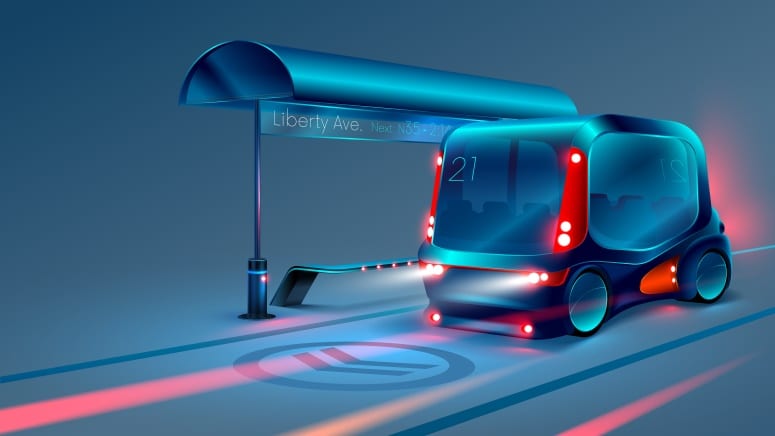
by James Sproul | Apr 7, 2021 | Education
Preparing Our Students for Tomorrow’s EV Jobs
Abstract
Driven by new technologies, mobility options are entering a period of radical changes. The first of these changes is already well underway, the move to Electric Vehicles (EVs). EVs will have an enormous impact on our students career opportunities, demanding new skills and rendering other skills obsolete. Schools must equip students with these new skills, so they will be ready for tomorrow’s jobs. We envision a cooperative, collaborative effort involving schools throughout Massachusetts, focused on creating new EV courseware and Mobility Centers.
Preparing Students for Tomorrow’s Jobs
Tomorrow’s job landscape will not look like today’s! As educators, we must provide students with the career skills these new jobs will require. Hands-on STEM education is key, with classes tied to tomorrow’s technologies.
Students who are comfortable with tomorrow’s technologies will be able to navigate the roads of economic change; those who are mystified and unsure will be lost. This hard reality applies to kids from underserved communities with life-altering consequences. Limited access to computer technology already puts them at a disadvantage and they are vulnerable to being left farther behind as future technologies emerge. Educators must look ahead and identify the technologies that are coming.
Mobility Industry Jobs Face Huge Changes
Economists, business analysts, and public planners now speak of ‘mobility’ rather that ‘transportation’. While the words may seem interchangeable, transportation means the act of moving people or products, while mobility encompasses all the ways people can move themselves or their products.
A dynamic, innovative mobility industry is now evolving, with huge implications for the world of work our students will face. Many of today’s jobs will disappear, but new ones will be created.
An amazing array of new technologies, and new business models, will define mobility’s future.[1] One part of the new reality is already here and ready for mass adoption, Electric Vehicles.
Electric Vehicles will dominate by 2035
EV technology is on the road today. Tesla is in the lead, while every other car maker in the world invests big dollars to catch up. In 2020, EVs (combining numbers for all-electric and hybrid models) made up about 2.5% of worldwide car sales. By 2029 that will climb to 25% and it will be over 50% by 2035, the year General Motors has targeted for achieving a completely electric product line.
The move to EVs is being driven by multiple factors. They are safer and quieter than gasoline powered vehicles, while also being less expensive to maintain because they have significantly fewer parts. Any increase in gasoline prices will boost EV sales, while growth will also be encouraged by government policies related to air quality and global warming. But the single biggest driver is the incredible leap in battery technology, with decreasing prices, expanding range, and extended useful lives. Tesla EV batteries now deliver a driving range of 400 miles, with a 1 million mile lifetime expected for the next generation. The new batteries make EVs practical, reliable, and affordable.
EV Technology and Tomorrow’s Jobs
By the end of this decade, millions of jobs will be related to manufacturing, maintaining, and repairing EVs. The people who fill those jobs will need new skills, because virtually everything in an EV powertrain is different from what is found in a gasoline powered vehicle. Tomorrow’s EV workforce, our students, will need to understand complex battery and recharging technologies, high performance electric engines, and completely new types of transmissions. Even suspension systems and tires will change because EVs are much lighter and last longer.
Preparing Massachusetts Students for EV Jobs
To equip Massachusetts students with the EV skills they’ll need, we envision a collaborative, cooperative effort by schools throughout the state. They will be innovative schools, committed to STEM education, ready to share costs and resources to achieve mutual goals, including:
- Creating focused, hands-on EV courseware
- Designing educational Mobility Centers to deliver that courseware
- Ensuring that all EV courseware is aligned with Automotive Service Excellence (ASE) standards
- Engaging with EV manufactures and dealership associations for internships, job placements and financial support
Get Involved:To learn more, and share your ideas, reach out to any of the authors. Our Cardinal Works program has successfully migrated MIT courseware on autonomous vehicles into Boston high schools. We’d enjoy discussing your school’s situation and how we can help prepare all our students for tomorrow’s EV jobs.
Kevin McCaskill Royal Bolling James Sproul
Executive Director Co-founder Co-founder
Madison Park Technical Vocational HS Cardinal Works Cardinal Works
kmccaskill@bostonpublicschools.com royalbolling@yahoo.com jsproul@sproulco.
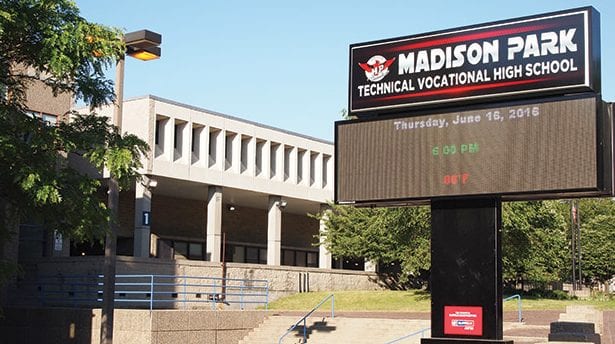
by James Sproul | Apr 7, 2021 | Education
Local Students Explore Autonomous Vehicles at MIT-BWSI
On Saturday, six local high school students will be working with tomorrow’s technology, guided by academics and industry experts. Representing Cape Cod Tech in Harwich and the O’Bryant School in Roxbury, these 9thand 10th graders will program small robotic cars to autonomously navigate a racetrack, learning about components from sensors to software.
“The RACECAR course is an extremely effective way to teach complex engineering concepts.” Said Joel Grimm, Program Manager, Beaver Works. “It’s been part of our MIT – Beaver Works Summer Institute (MIT-BWSI) for high school students since 2016. The RACECAR courseware has even been incorporated into the standard curriculum at Madison Park Technical Vocational HS as part of the Cardinal Works initiative.”
“We see this as a first step in preparing our students for a new wave of jobs.” Added Rene King, IT teacher at Cape Cod Tech. “Autonomous vehicles will drive huge changes; some jobs will disappear, but others will be created. As educators, we must prepare students for those future jobs.”
MIT-BWSI teaches STEM skills to high school students through over a dozen project-based, workshop-style courses. RACECAR was the first course offered and is updated every year.
To learn more about RACECAR and Boston students, see World-class STEM Courseware from MIT-BWSI to Boston Public School or contact Jim Sproul at 617-459-2969, jsproul@sproulco.com.
Cardinal Works is a collaborative effort by Madison Park Technical Vocational High School and The Sproul Company, focused on delivering mobility industry education to high school students in Massachusetts and beyond.
Cape Cod Regional Technical High School is excited to partner with MIT-BWSI to offer our students the opportunity to learn cutting-edge technologies around autonomous vehicles. Providing our future engineers the experience to explore the possibilities of autonomous vehicles and build their 21st-century skills will enable them to be ahead of the curve as they prepare for their future. We are honored and privileged to be part of this awesome adventure.
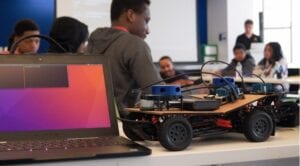
by James Sproul | Mar 4, 2021 | Autonomous Vehicles, Sproul Company News
Tomorrow’s job landscape will not look like today’s! As educators, we must provide students with the career skills these new jobs will require. Project based, hands-on STEM education is key, with classes tied to tomorrow’s technologies.
Students who are comfortable with those technologies will be able to navigate the roads of economic change; those who are mystified and unsure will be lost. This hard reality applies to kids from underserved communities with life-altering consequences. Limited access to computer technology already puts them at a disadvantage and they are vulnerable to being left farther behind as future technologies emerge.
Autonomous Vehicles Are the Next Wave
Autonomous vehicles will be a major factor in the future economy, driving transformations that are just beginning but will impact virtually every industry. Some of today’s jobs will disappear, but new ones will be created
Experts disagree about the speed of this change but all acknowledge that in 25 years (or less) the job openings for a truck driver will be equivalent to those for a blacksmith. We must give students the skills to work with autonomous vehicles, because the old jobs will be gone.
Future-focused Education
Unsurprisingly, MIT stepped up to meet this education need with the Beaver Works Summer Institute (BWSI) for selected high school students. BWSI teaches STEM skills using a hands-on approach, where students work together in small groups developing their own solutions to design challenges.
In the first BWSI course, RACECAR, students program small robotic cars to autonomously navigate a racetrack. It has proven to be an extremely effective way to teach complex engineering concepts. Students who complete the course are comfortable with all the technology components used by an autonomous vehicle, from sensors to software.
Adapting Courseware for Boston Public Schools
In 2020, The Sproul Company (TSC) collaborated with BWSI to roll out a program called “Cardinal Works”, bringing RACECAR to public high schools. At Madison Park TVHS in Roxbury, teachers were trained by the BWSI experts, then began using the courseware in a Saturday School program. When COVID intervened, they continued the Saturday program as remote learning. The culmination was an outdoor event last summer, where the student-programmed model car successfully navigated itself through a track, achieving a tremendous victory over a host of COVID challenges.

Autonomous model cars are programmed by students
Student enthusiasm was terrific. “It was so cool when the car we programmed really drove itself all the way through the track.” Said one student. “Our team worked really hard and finally all the pieces came together. I was so excited.”
Building on the Saturday School success, Madison Park incorporated RACECAR into an elective course, Introduction to Computer Science, using BWSI’s car simulation software.
Teachers Love the Flexibility
A key RACECAR feature is flexibility. “We try to keep the pace one step ahead of the student’s skills,” said Michael Berger, co-teacher of the Madison Park program. “Sometimes an idea just clicks. When it does, we add that component to the project and move on. The next topic may be more of a challenge, so we stick with it for a while until it is really clear how it works.”
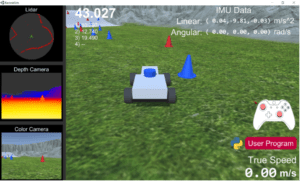
RACECAR simulation software
We Will Help You Bring RACECAR to Your School.
BWSI, TSC, and the Madison Park faculty all want to help bring the Cardinal Works RACECAR Program to more students in Boston and beyond. TSC is currently working with three other Boston Public Schools to implement RACECAR. Support includes teacher training, printed and electronic media, simulation software, and fully equipped model cars. Because it comes as a complete package, RACECAR puts few demands on already strained school resources.
For more details, reach out to any of the authors. We’d enjoy discussing your specific needs and how RACECAR can help your students prepare for tomorrow.
Kevin McCaskill Royal Bolling James Sproul
Executive Director Co-founder Co-founder
Madison Park Technical Vocational HS Cardinal Works Cardinal Works
kmccaskill@bostonpublicschools.com royalbolling@yahoo.com jsproul@sproulco.com







Recent Comments